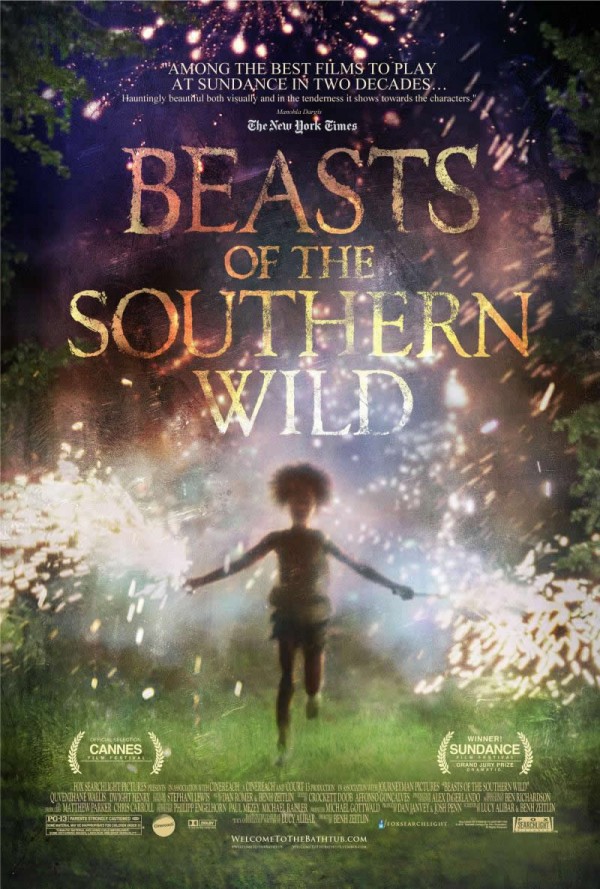![]() BY DAVID CORBO In Beasts of the Southern Wild, first time director Benh Zeitlin transmutes Lucy Alabar’s one act play, Juicy and Delicious, into a deeply humanist film that speaks to the urgent fact that we have disrespected the resources of our Mother Earth, perhaps irreparably disrupting the balance of nature that is so necessary to our survival. This myopic view of an impoverished isolated community threatened by global warming won Zeitlin the Caméra d’Or award at the 2012 Cannes Film Festival, the Grand Jury Prize: Dramatic at the 2012 Sundance Film Festival, and was designated a 2012 critics pick by the New York Times amongst other accolades.
BY DAVID CORBO In Beasts of the Southern Wild, first time director Benh Zeitlin transmutes Lucy Alabar’s one act play, Juicy and Delicious, into a deeply humanist film that speaks to the urgent fact that we have disrespected the resources of our Mother Earth, perhaps irreparably disrupting the balance of nature that is so necessary to our survival. This myopic view of an impoverished isolated community threatened by global warming won Zeitlin the Caméra d’Or award at the 2012 Cannes Film Festival, the Grand Jury Prize: Dramatic at the 2012 Sundance Film Festival, and was designated a 2012 critics pick by the New York Times amongst other accolades.
Welcome to the “Bathtub,” the mythic island bayou community south of the Louisiana levee where Beasts of the Southern Wild is set. Using grainy 16mm film, handheld camera moves and tightly framed shots, Zeitlen keeps us emotionally close to a small group of poor, uneducated residents who have refused government orders to leave their sinking home.
Narrating with a palpable sense of gritty determination, six-year-old Hushpuppy (Quvenzhané Wallis) affirms the film’s stark thematic territory in her opening statement: “The whole universe depends on everything fitting together just right. If one piece busts, even the smallest piece, the whole universe will get busted.” Hushpuppy lives in a closed world of dysfunction and poverty. Her father Wink (Dwight Henry) is a harsh alcoholic who disappears for days on end, dispensing hard lessons on survival when he is present. The few other adults in her world seem to live at Joy Luck’s bar, where exuberant inebriation is a way of life. The four or five children in the Bathtub are, inexplicably, all female and motherless. Later in the film, the children swim out to a point of light on the watery horizon (a repeated image that has the feel of the Siren’s call) in search of their missing mothers only to find a brothel in a lighthouse.
Despite its destitute nature, life in the Bathtub relies on a joyful balance with nature. Hushpuppy and Wink pull fish out of the bayou’s waters with their bare hands and the film is replete with images of hungry residents gorging on piles of crab and shrimp that just appear from nowhere. It’s as if the mythic Mother Earth gives to them freely and they take without question. That is, until a storm inundates the Bathtub, leaving death and destruction in its wake. Extinct Aurochs (prehistoric cattle) thaw from the Antarctic ice and begin an angry trek across the land as Wink decides to blow the levee and drain the Bathtub to restore its bounty. But what do they find on the other side of the levee? They find themselves plugged into a hospital’s inhuman machines. Disoriented and afraid, they flee the civilized world to return to their primitive relationship with the earth.
Cleverly mixing myth and metaphor, Zeitlin creates a contemporary parable that paints the effects of environmental change on a human canvass. In a world where the facts of global warming and dwindling resources are ridiculed by avaricious profiteers, this evocative film is a potent reminder that we are failing as the shepherds of our planet. Beasts of the Southern Wild is an important as well as entertaining film that will no doubt gather its share of Academy nominations.

